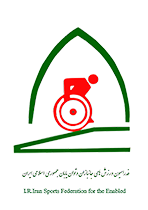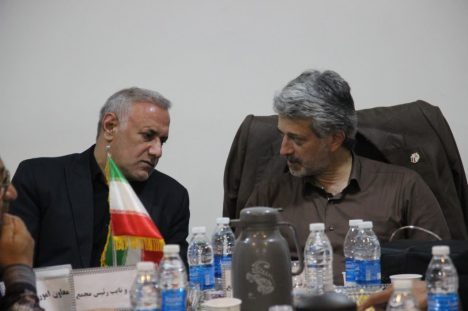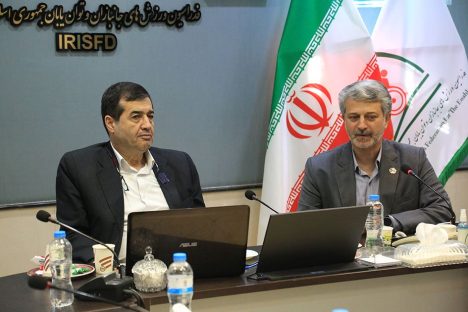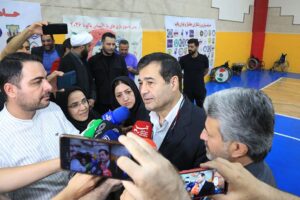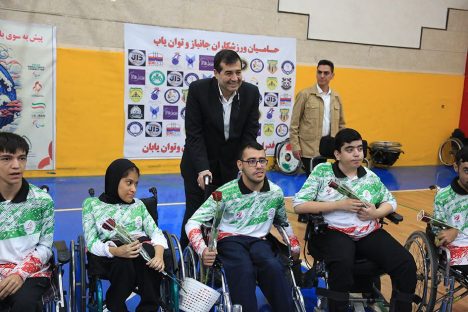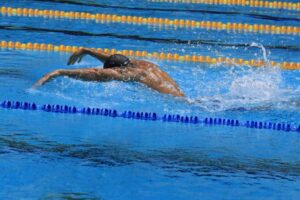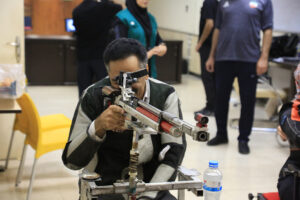Dr. Jalil Koohpayezadeh, President of the Federation, expressed satisfaction with the performance of Golestan Province during the General Assembly of the province’s Veterans and Disabled Sports Board.
According to the Public Relations office of the Federation, Dr. Koohpayezadeh began by offering condolences on the occasion coinciding with the mourning for Seyyed al-Shuhada Aba Abdullah al-Hussein (AS) and the Arbaeen of the martyrs of the 12-day Holy Defense. He emphasized that today’s security and peace are owed to the blood of the martyrs, and expressed hope that this peace and security will be leveraged for the development and progress of the country in veterans and disabled sports.
He continued by describing Golestan as a province known for champion-making, which relative to its population has achieved successful results in disability sports. The province’s board ranking in the annual evaluation has been very valuable considering that Golestan is among the newer provinces competing, and the board has overperformed relative to expectations.
Dr. Koohpayezadeh noted that Golestan is an agricultural province without much industrial background, yet it has managed to nurture successful Paralympic champions. He warmly thanked all personnel involved in the provincial and county boards for their efforts and hard work.
Highlighting the source of the federation’s successes, he credited the proud veterans who once were athletes and today serve as coaches and mentors, sharing their experience with national athletes, thus ensuring continued achievements.
He stressed that the federation’s officials support all those committed to promoting veterans and disabled sports. The formation of the national sitting volleyball team, which will be sent to Nagoya, and the presence of Zahra Nemati as head coach of the national para-archery team demonstrate this commitment. He expressed determination to turn challenges into new opportunities.
Dr. Koohpayezadeh also appreciated the positive outlook of the Ministry of Sports and Youth toward veterans and disabled sports, specifically thanking Dr. Donya Mali and the Minister, who has doubled the federation budget this year. The ongoing support from the ministry is a source of encouragement, and the federation hopes to repay this trust with outstanding results.
He remarked with optimism based on meetings with Dr. Donya Mali that while they appreciate their current capacities, they will continue efforts for greater success.
Regarding women’s sports, he noted that in Golestan, women’s veterans and disabled sports are still underdeveloped compared to men’s sports and lag behind the national average. He urged the provincial board officials to employ better strategies this year to develop and expand women’s sports. The board has performed well in talent identification, and by utilizing these capacities along with registration of athletes in the online registration system and the future talent identification system, women’s sports can grow significantly alongside men’s.
Referring to Asian and global Virtus competitions for athletes with intellectual disabilities, Dr. Koohpayezadeh urged the provincial boards to identify talented athletes in the ID category alongside Paralympic sports and introduce them to sports. This would help ensure successful representatives in important events such as the Paralympic Games in sports like swimming, athletics, and table tennis for intellectually impaired athletes, thereby increasing the national delegation’s medal count.
He emphasized the importance of training referees and especially coaches, stating that while infrastructure and equipment are very important, what truly prepares athletes for championship competition is a knowledgeable, up-to-date coach. Provincial boards must therefore make efforts to hold educational courses and send their coaches and referees to advanced training classes, ensuring that athletes from their province arrive in the national team fully aware of the latest global rules.
Dr. Koohpayezadeh stressed the necessity of implementing the Supreme Council of the Cultural Revolution’s resolution in the provinces—a resolution issued by the president—which can be expedited by leveraging the capacity of the provincial Public Culture Council and by utilizing the assigned responsibilities of executive bodies for the development of veterans and disabled sports.
He highlighted the presence of influential individuals in the provincial board’s executive structure as an effective step toward progress. Involvement of representatives from the Islamic Consultative Assembly (Parliament), city council members, economic activists, academics, and media professionals can help operationalize the board’s goals more swiftly, enabling better promotion of Paralympic champions and sports figures from the province.
In closing, the federation president underlined that the provincial board must utilize the capacities of philanthropists, social responsibility initiatives, and sponsorships from private and non-governmental public sectors to achieve stable financial resources. This financial stability is crucial to avoid budgetary problems when participating in national competitions, hosting events, or organizing training camps for national teams.
It is worth noting that at the end of the assembly, with support and cooperation from the Director General of Sports and Youth, emphasis was placed on pursuing the operational use of the provincial board’s swimming pool, which is currently under private sector management.

